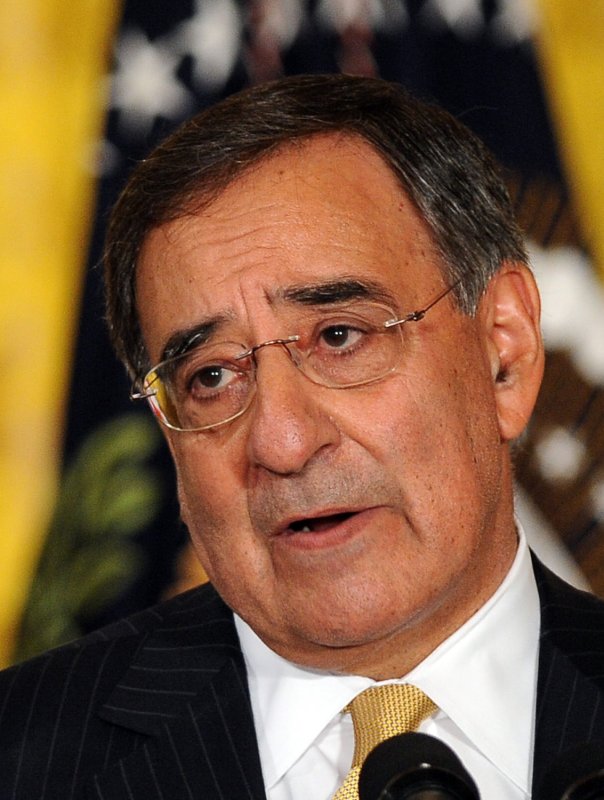1 of 7 | Leon Panetta speaks after U.S. President Barack Obama named him to replace Secretary of Defense Robert Gates in the East Room of the White House in Washington, DC, on April 27, 2011. UPI/Roger L. Wollenberg |
License Photo
LANGLEY, Va., May 3 (UPI) -- U.S. Central Intelligence Agency Director Leon Panetta said Tuesday a photograph establishing the death of Osama bin Laden "will be presented to the public."
In an interview with NBC News, Panetta also acknowledged that some information used in the pursuit and killing of the al-Qaida leader in Pakistan Sunday came from detainees subjected to so-called enhanced interrogation techniques but stopped short of saying the operation benefited from information gained through waterboarding.
Panetta told NBC he has seen the photographs and "we've analyzed them and there is no question it's bin Laden," who was buried at sea soon after he was slain.
He acknowledged the question of "just exactly what kind of impact these photos might have" is a consideration in the decision on releasing them.
"The government obviously has been talking about how best to do this but I don't think there was any question that ultimately a photograph would be presented to the public," Panetta said, adding "the bottom line is that we got bin Laden and I think we have to reveal to the rest of the world the fact that we were able to get him and kill him."
Panetta said the world "is a little safer today" because the man behind the Sept. 11, 2001, terror attacks on the United States is dead but "al-Qaida remains a threat."
A debate has arisen since bin Laden's death about whether waterboarding of detainees produced intelligence that led to the climactic raid. Panetta said the United States had "multiple sources for information."
"Clearly some of it came from detainees and the interrogation of detainees but we also had information from other sources as well," he said. "I think clearly some of the detainees, clearly were, they used these enhanced interrogation techniques against some of these detainees but I'm also saying the debate about whether we would have gotten the sane information through other approaches I think is always going to be an open question."
Separately, Panetta confirmed Pakistan was not told about the raid because it might have leaked word to the target, Time magazine reported Tuesday.
The CIA had been considering for months how to structure the raid on the compound where bin Laden had been staying, Time reported, and had looked at expanding participation to other countries, Pakistan in particular. The CIA ruled out an expansion with U.S. ally Pakistan because "it was decided any effort to work with the Pakistanis could jeopardize the mission.
They might alert the targets," Panetta told the magazine.
A high-altitude bombing by B2 stealth bombers or a cruise missile attack were also considered, Panetta said, but was ruled out because of possible collateral damage to civilians.
Panetta assembled a group of 15 aides April 26 to consider the credibility of the information they had collected on the Abbottabad, Pakistan, compound where bin Laden was believed to be hiding, Time said. The magazine said despite circumstantial evidence bin Laden was living in the compound, U.S. satellites had not photographed him or members of his family.
The group could not reach a consensus, but Panetta concluded there was strong enough evidence to risk a raid, the magazine reported. He then took his case to President Barack Obama.
Obama heard arguments for and against the raid Thursday, and Panetta conceded evidence of bin Laden's presence at the compound was circumstantial, Time reported. But Panetta said he told the president and his advisers, "We have the best evidence since [the 2001 battle of] Tora Bora [where bin Laden was last seen], and that then makes it clear that we have an obligation to act."
Time said Panetta only learned Friday the president had been convinced by his arguments when Obama said he was authorizing the helicopter mission in a signed letter.
After he received Obama's order, Panetta ordered Vice Adm. William McRaven, head of the Joint Forces Command, to begin the mission.
Intelligence reporting suggests one of bin Laden's wives who survived the attack said the family had been living at the compound since 2005, a source told Time, raising questions about Pakistan's knowledge of his whereabouts.















